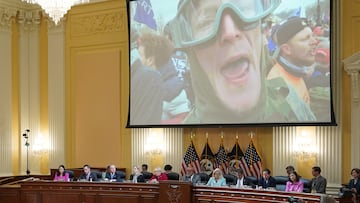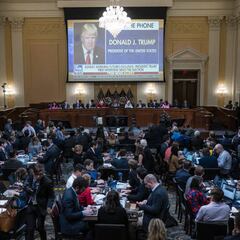What can we expect to learn from the third public hearing on the January 6 attack on the U.S. Capitol?
The third hearing for the Select House Committee on January 6th will take place on Thursday 16 June. What can we expect?


The second hearing of the Select House Committee on January 6th wrapped up on Monday afternoon, with the third that had been slated for Wednesday morning, but was postponed and will now begin at 1 PM ET on Thursday 16 June.
Trump lost the election, knew he lost, yet continued to claim the election was ‘stolen’ and spread the Big Lie.
— January 6th Committee (@January6thCmte) June 13, 2022
Watch the Select Committee’s hearing 2 recap ⤵️ pic.twitter.com/CQOXUKjLc6
The third hearing will focus on how former President Trump planned to replace Attorney General Bill Barr with officials who would be willing to support his false claims of election fraud. In Monday’s hearing, the public heard from Mr. Barr that he had told Trump, on multiple occasions, that he was unwilling to use the Department of Justice to investigate possible instances of electoral fraud. The former AG told the former president that his campaign would need to file reports with state law enforcement agencies because his department could not litigate the outcome of an election.
Vice-Chair of the Select Committee Liz Cheney (R- WY) stated in the first hearing that the President had told top officials at the Department of Justice to “Just say the election was corrupt and leave the rest to me and the Republican Congressmen.” Trump had hoped that if enough of the public supported his bogus claims, members of Congress would vote against the election certification on January 6th, and the question of electing the president would be sent to state legislatures. When officials like Bill Barr told the president they would not support his claims, “President Trump decided to replace them.”
"I repeatedly told the President in no uncertain terms that I did not see evidence of fraud, you know, that would have affected the outcome of the election.... a year and a half later, I still haven’t seen anything to change my mind on that." -Trump’s Attorney General Bill Bar pic.twitter.com/7m3kMDluRJ
— January 6th Committee (@January6thCmte) June 11, 2022
Bill Barr resigned on 23 December 2020, just weeks before rioters invaded the Capitol.
President Trump begins to appoint officials more friendly to him
Donald Trump offered the job of Acting Attorney General to Jeff Clark, who had served as an environmental lawyer at the Department of Justice since 2017. In September, Mr. Clark was promoted to United States Assistant Attorney General for the Civil Division where he began to use his power at the Department of Justice to pursue defamation suits against women who had accused President Trump of sexual assault and rape.
Without the support necessary to appoint Mr. Clark to Acting Attorney General, then-Deputy AG Jeffrey Rosen was chosen. This left Mr. Rosen’s position as Deputy Attorney General vacant and Richard Donoghue, who previously had served as United States Attorney for the Eastern District of New York, was appointed.
In the days after January 6th 2021, Acting AG Rosen spoke out against the violence that unfolded at the Capitol.
While, Mr. Clark had not been appointed to either of the top positions at the Department of Justice this did not stop the president from pressuring him to pursue actions that would make his claims of election fraud more believable.
President Trump told Mr. Clark that he wanted a letter to be sent to Georgia and five battleground states that the “U.S. Department of Justice had ‘identified significant concerns that may have impacted the outcome of the election.’” Mr. Clark took the letter to Acting AG Rosen and Deputy AG Richard Donoghue who flatly rejected to send any type of letter to any state.
Richard Donoghue, the Deputy Attorney General, told to the Committee that this move would have urged “multiple states to withdraw their official and lawful electoral votes for Biden.” Mr. Donoghue also stated that he saw sending such a letter as “a grave step for the department to take, and could have tremendous constitutional, political, and social ramifications for this country.”
The appointment of Mr. Clark was encouraged by Congressman Scott Perry, who in the weeks after the events on January 6th had sought a pardon from President Trump.
Mr. Donoghue aptly noted that the interference the president was asking the officials to make was “nothing less than the United States Justice Department meddling in the outcome of a Presidential Election.”
Rosen, Donoghue, and other top officials agree to testify publicly
Related stories
The public will hear from officials who interrupted a meeting between Mr. Trump and Mr. Clark in the Oval Office over fears that the two were planning to use the Department of Justice to push the bogus claims of election fraud even further. Business Insider has reported that Mr. Donoghue will appear on a panel during the third hearing on 16 June with US Attorney General Jeffrey Rosen, former White House Counsel Pat Cipollone, and former DOJ attorney Steve Engel.
One witness who has rejected invitations to be interviewed by the Committee is Jeff Clark who has “has invoked his 5th Amendment privilege against self-incrimination and refused to testify.” Congressman Scott Perry, who was one of the key advocates for the appointment of Mr. Clark, has also refused to testify.
